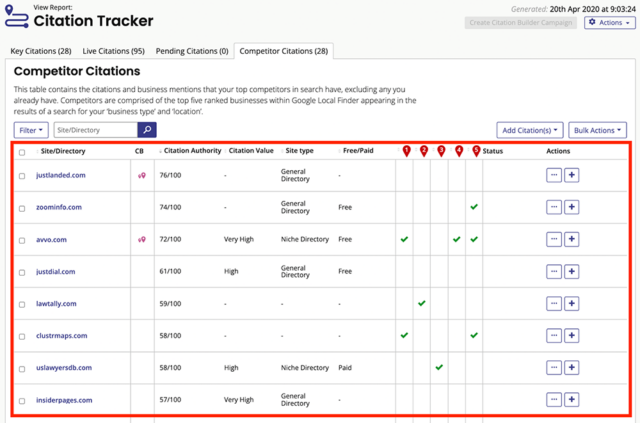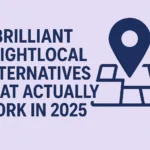introduction to Who are BrightLocal competitors
As someone who’s spent way too many late nights tinkering with citation tools, scraping Google Maps, and obsessing over local rankings, I get it—BrightLocal is often the first name that comes to mind when you think “local SEO.” But what if you’re hunting for fresh features, different pricing, or just something a little more… you? Let’s dive into seven punchy alternatives that could become your new best friends in the local search world.
Why Look Beyond BrightLocal?

I remember the first time I ran a BrightLocal report. The interface was slick, the data satisfying—but after a few months, I started to crave more:
- Pricing Flexibility: Those tiered plans can get steep if you manage multiple clients.
- Unique Features: Maybe you need deeper keyword tracking or a stronger review-generation workflow.
- Customer Support: Ever tried explaining your problem at 2 a.m. to a support rep across the globe?
If any of that resonates, keep reading. You’re about to discover tools that can fill the gaps BrightLocal left behind.
1. Whitespark: The Citation King
What Makes Whitespark Stand Out
Whitespark has carved out a reputation as the go-to for citation building. Their Local Citation Finder will uncover missing citations, while the Citation Builder service—complete with hand-built submissions—takes the heavy lifting off your plate.
Personal Tip: Whenever I onboard a new brick‑and‑mortar client, Whitespark’s citation clean‑up feature is my first stop. It’s like Marie Kondo for online mentions.
Key Features
- Local Citation Finder & Builder
- Rank Tracking across Google Maps & organic
- Reputation Builder for review generation
Pricing Snapshot
- Starts at $29/month for basic rank tracking
- Citation services priced per citation, starting at $8 each
Pros & Cons
| Pros | Cons |
|---|---|
| Ultra‑deep citation database | Citation services can get pricey |
| White‑glove submission option | Limited dashboard customizations |
| Great for agencies | Steeper learning curve |
2. SEMrush: The All‑Rounder
Why SEMrush Isn’t Just for Keywords
SEMrush is like that Swiss Army knife you never leave home without. Sure, you know them for keyword research—but their Listing Management product syncs your business data across major directories, and their Position Tracking can zoom into local packs.
Real-World Insight: I once rescued a local café whose name was misspelled on 15 directories. A couple clicks in SEMrush’s Listing Management and they shot back up into the local 3‑pack.
Key Features
- Keyword & rank tracking for local and national
- Listing Management across 70+ directories
- On‑page SEO auditing & backlink analysis
Pricing Snapshot
- Pro plan at $119.95/month (includes limited Listing Management)
- Business plan at $449.95/month (advanced reporting & API access)
Pros & Cons
| Pros | Cons |
|---|---|
| All‑in‑one marketing suite | Pricier for smaller outfits |
| Massive database & integrations | Can feel overwhelming |
| Excellent reporting & API | Listing sync can lag |
3. Moz Local: The Brand Trust Builder
Building Consistent Brand Signals
Moz Local focuses on accuracy. Their philosophy: “If your data’s clean, Google trusts you.” They’ll push your business info to top aggregators and local search engines, plus track your reviews.
Casual Confession: I geek out over Moz’s Domain Authority. Combine that mojo with Moz Local’s citation sync, and you’ve got a powerhouse trust signal.
Key Features
- Data sync to aggregators (Neustar Localeze, Foursquare, etc.)
- Review monitoring & management
- Duplicate suppression & clean‑up
Pricing Snapshot
- From $129/year per location (includes annual data clean‑up)
- Agency bundles available
Pros & Cons
| Pros | Cons |
|---|---|
| One‑click distribution | Limited to major platforms |
| Clean‑up tools suppress duplicates | Review management is basic |
| Affordable annual plan | Lacks advanced reporting |
4. Yext: The Enterprise Powerhouse
When You Need Industrial‑Strength Control
Yext is built for big players—think multi‑location franchises or nationwide service brands. Their Knowledge Network spans hundreds of sites: from Apple Maps to Amazon Alexa. Updates propagate almost instantly.
Insider Anecdote: I watched a major chain update 500 locations’ hours in under a minute. If that doesn’t make you feel like a wizard, I don’t know what will.
Key Features
- Real‑time listing sync to 100+ platforms
- Customizable info cards & rich snippets
- Analytics dashboard with search journey mapping
Pricing Snapshot
- Plans start at $199/year per location (for basic listings)
- Premium plans for analytics & advanced features
Pros & Cons
| Pros | Cons |
|---|---|
| Unmatched network coverage | Not budget‑friendly for SMBs |
| Instant updates | Steep learning curve |
| Advanced analytics | Support can be slow |
5. Synup: The Data‑Driven Dynamo
Deep Data, Smarter Decisions
Synup bills itself as a “data management and analytics platform,” and they’re not kidding. Beyond listings, they capture sentiment from reviews, analyze search visibility, and give you granular insights.
Pro Tip: Synup’s review sentiment analysis saved me hours when I needed to extract actionable items from 1,000+ customer reviews.
Key Features
- Listing management across 70+ channels
- Review monitoring + sentiment analysis
- Search performance & analytics
Pricing Snapshot
- Starting at $30/month for basic listing sync
- Custom enterprise pricing for analytics-heavy use cases
Pros & Cons
| Pros | Cons |
|---|---|
| Powerful analytics | UI can feel dense |
| Sentiment analysis adds depth | Higher tiers get expensive |
| Useful API integrations | Learning curve for data nerds |
6. BrightEdge: The SEO Powerhouse (Beyond Local)
Scaling Local SEO to Enterprise SEO
BrightEdge is often synonymous with enterprise SEO. Their Local Reporting module plugs seamlessly into their core platform, giving you both local and national insights in one place. If you’re already on BrightEdge, it’s a no‑brainer.
Personal Note: I used to juggle separate tools for local and organic. BrightEdge’s unified view felt like pulling off a magician’s multitask trick.
Key Features
- Local reporting & local keyword data
- Content performance & recommendations
- Competitive analysis at scale
Pricing Snapshot
- Custom enterprise pricing (expect five figures)
Pros & Cons
| Pros | Cons |
|---|---|
| Holistic SEO view | Out of reach for small businesses |
| Data-driven recommendations | Complex setup & onboarding |
| Top-tier support | No standalone local plan |
7. Local Falcon: The Visual Rank Tracker
Map Your Rankings—Literally
Local Falcon’s thing is visual: take any address and generate a “heatmap” of keyword rankings around it. It’s an amazing way to understand geographical ranking fluctuations. Who are BrightLocal competitors
Funny Story: I once showed a client the “cold zone” around their office, and they were so motivated to optimize that they baked me cupcakes. Win‑win! Who are BrightLocal competitors
Key Features
- Local rank heatmaps across neighborhoods
- Multi‑keyword, multi‑location analysis
- Scheduled reports
Pricing Snapshot
- Plans start at $39/month for 10 searches
- Scaling to $199/month for larger needs
Pros & Cons
| Pros | Cons |
|---|---|
| Unique visual insights | Limited to rank tracking |
| Easy-to-read heatmaps | No citation or review tools |
| Affordable for local shops | Not a full SEO suite |
How to Choose Your Perfect BrightLocal Alternative
- Assess Your Needs
- Citation‑heavy? Lean toward Whitespark or Moz Local.
- Enterprise scope? Yext or BrightEdge.
- Data & sentiment? Synup or SEMrush.
- Budget vs. Value
- Maybe you only need basic listing sync—Local Falcon or Whitespark’s entry plan could suffice.
- If you have big ambitions, an all‑in‑one like SEMrush or Yext might save you juggling fees. Who are BrightLocal competitors
- Ease of Use
- Some platforms come with steep learning curves (BrightEdge, Yext).
- If you’re flying solo, cleaner UIs like Moz Local or Local Falcon can get you rolling in minutes.
- Future Needs
- Plan for growth. If you’ll expand to new locations or add services, pick a tool that scales with you.
- Trial Runs
- Almost every one of these offers a free trial or demo. Carve out an hour, create an account, and kick the tires.
My Personal Workflow
- Early-Stage Clients: Whitespark + Local Falcon
- Mid‑Tier Growth: SEMrush + Synup combo
- Enterprise & Franchises: Yext or BrightEdge
This modular approach has saved me thousands in overlapping licenses, and clients appreciate paying only for what they actually use.
Bonus Tips for Maximizing Any Local SEO Tool
- Stay Consistent: Your NAP (Name, Address, Phone) must be verbatim across all platforms.
- Solicit Reviews: Set up an automated workflow—people are more likely to leave a review when you make it easy.
- Track Progress: Schedule monthly heatmaps or rank reports to spot dips before they become disasters.
- Leverage APIs: If you have dev resources, connect your tool to your CRM or dashboards.
- Combine Data Sources: Cross‑reference review sentiment from Synup with rank data from Local Falcon for holistic insights.
Conclusion
Choosing the right BrightLocal competitor isn’t about abandoning ship—it’s about steering your local SEO vessel toward the horizon that aligns with your unique needs. Whether you’re a solo consultant looking for budget‑friendly citation magic (hello, Whitespark) or a 300‑location brand craving enterprise synchrony (Yext’s got your back), there’s an option tailored for you.
Ready to level up your local SEO game? Pick one of these powerful tools, dive into a trial, and watch those rankings climb.





